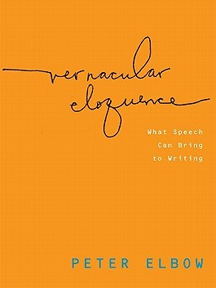By Sean Ross Meehan
Scholars familiar with the influential legacy of Peter Elbow, his forty years of studies in the practice and theory of teaching writing, will recognize the enthusiasm he expresses in summarizing the argument of his stimulating new book. “I’M AN ENTHUSIAST,” Elbow writes, with emphasis in the original: “I think that everyone can write better and with less frustration and anxiety if they harness the enormous powers of their vernacular speech.” Elbow is a legendary figure in the writing process movement that has thoroughly shaped writing pedagogy since the 1970s. His name is particularly associated with the practice of “freewriting,” the use of informal and unedited writing as a place to begin the more formal writing (Standard Written English) expected in schools. Elbow describes this nonstandard approach as inviting “wrong writing on the way to right writing.” In his first book (published 1973), he signaled his nonconformist pedagogy as early as the title, Writing Without Teachers. Forty years later, the practice of freewriting has become standard in most composition classes. Vernacular Eloquence extends the lessons of freewriting to the “myriad linguistic and rhetorical virtues in unplanned spoken language.” Elbow’s enthusiasm quoted above retains a marker of those unplanned and repressed virtues of voice: his use of the singular “everyone” with a plural pronoun (“they”) that is natural and more eloquent in the ear of the vernacular but wrong in the conventions of grammar.
In many ways, Elbow is arguing for a careful return of the repressed in re-valuing speech as the natural origin of writing. For audience, Elbow seeks teachers and scholars as well as readers “in the general intellectual community who think about writing and literacy but don’t care about the scholarship.” In “Speaking onto the Page,” Elbow explores the “role for the tongue in the early stages of writing,” while in the third part, “Reading Aloud to Revise,” he argues for the effective use of the voice for the editing of writing. A final section of the book imagines a “new culture of vernacular literacy on the horizon,” Dante’s “noble vulgar eloquence” reinvigorated by the spread of World Englishes and various forms of nonstandard communication including e-mails and blogs.
Throughout the book, Elbow effectively sifts through the extensive academic material with an eye to the general reader. At the end of each chapter, for example, Elbow provides an interludic “literacy story” that weaves the linguistic practice or convention at issue in the chapter back into its rich and complex and often more playful (unconventional) historical context. In many of these interludes, Elbow narrates a conflict between rhetorical (oratorical) and grammatical (syntactical) traditions, between the spoken voice and the written word, in which once-valued lessons of the vernacular lose out to the prescriptive conventions of academic literacy.
One need not be a scholar in composition studies or even a teacher of writing to appreciate the story Elbow tells. Although I am a scholar and teacher engaged in the study of writing, and though I found myself making several notes of practical suggestions I might extend into my writing classroom, I was most engaged by the broader pedagogical implications of Elbow’s return to the vernacular. His argument brought to mind William James’s definition of philosophy in the liberal arts tradition: “to make conventionalities fluid again.” Elbow’s brand of linguistic pragmatism proposes the “democratization of literacy and especially writing” as the way to free anxious writers from the artificial constraints of a linguistic purity that never was nor can be. The book is worth the reflection it provokes regarding the complex and problematic impurities of the language we use, though Elbow can’t solve the problem. For there is a paradox, here, that returns us to his earliest work and extends it even further: writing without teachers, more freely trusting our voice (with help, of course, from Elbow’s written teachings), we might someday learn to write without writing. Without the vernacular, we lose Dante and all of English literature; but without the conventions of writing, we might have nothing to show for it.
Sean Ross Meehan (ΦBK, Princeton University, 1991) is Associate Professor of English and Director of Writing at Washington College. He is a resident member of the Theta of Maryland chapter of Phi Beta Kappa.




